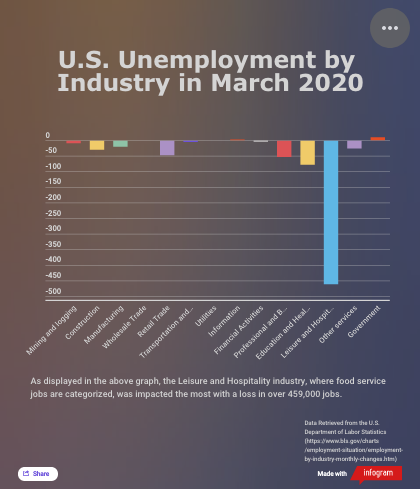Originating on Facebook, an online support group targeted toward providing financial relief to food industry workers in Woodstock, Georgia, offers hope during the coronavirus pandemic.
Why It’s Newsworthy: The food service industry has been hit significantly hard due to safety requirements of COVID-19. The income of workers in this industry has been severely impacted, with many needing financial aid in order to make ends meet and provide for their families.

The group was founded by Bryttany Hyde, a worker at the restaurant Rootstock & Vine, which is located in the downtown area.
“During my last shift at work, which was unknown to me at the time, I felt that things would soon be different. Sitting there waiting for to-go orders that weren’t coming, I knew other restaurants in the area were in the same situation,” said Hyde. “That morning, I created a Facebook group and GoFundMe for the staff of restaurants in Downtown Woodstock.”
Hyde’s initiative has already raised nearly $10,000 in financial aid for workers. In order to receive the aid, Hyde has developed an application process. As of right now, 21 workers in the area have been provided allocations of the money raised so far.
In addition to the money raised from the GoFundMe, Hyde has also created other methods for locals to contribute to this effort.
“The Facebook group also features the restaurants, fundraisers, giveaways, and a list of staff members’ CashApp/Venmo so the community can ‘tip’ them,” said Hyde.
Dustin Lohman was a bartender at Freight Kitchen & Tap in downtown Woodstock, who lost his job as a result of COVID-19. Due to the GoFundMe set up by Hyde, Lohman was able to apply for and become a beneficiary of one of the multiple financial packages being dispersed by this effort.

“Being out of work for the last month and having difficulties receiving my unemployment has put an enormous financial strain on myself and my family… this helped me keep my head above water while we figure this new way of life out,” said Lohman.
Beaming with joy at the help provided so far, Hyde has high hopes for the continued success of this initiative.
“To me, the future looks like funding every applicant in Downtown Woodstock, and if the funding comes through, I would love to extend funding to all of Woodstock and eventually all of Cherokee County,” said Hyde.
Woodstock is one of many communities across north Georgia that have developed means of providing financial relief to those affected by COVID-19. One example being the city of Dunwoody, who has also found interesting ways to fundraise for local artists who are out of work, by selling and installing creative yard signs with messages of hope.
With the U.S. Department of Labor reporting 701,000 jobs lost in the month of March alone, any form of financial aid is pivotal for many households to make ends meet. Communities engaging in philanthropic work such as those of Woodstock and Dunwoody provide inspiration and hope to those individuals faced with extreme economic uncertainty during this pandemic.
Susan Winer, an expert global philanthropic advisor, explained this to the Family Wealth Report, by stating, “for a significant number of people; low income, hourly workers, immigrant populations and others who are part of or on the fringes of the disenfranchised population… they face the potential of serious disruption to their lives.”
Winer continues, “for many people the only port in the storm is the nonprofit community.”
Winer highlights a significant notion that exerts a possible limitation for initiatives such as Hyde’s: how long are philanthropic revenue streams deemed to last? While the data is unknown in regards to philanthropic efforts in response to COVID-19, it does serve as a primary topic in the conversation.
With the exact amount continuously growing, and therefore difficult to quantify, NPR reports the number of restaurants specifically that have closed across the country are in the multiples of thousands. The following chart does give context regarding job loss in the industry, however, it displays unemployment within the leisure and hospitality industry over the span of one month since COVID-19 hit.

The economic devastation that has ensued in light of COVID-19 has brought forth a tremendous amount of community co-operation. The light in the darkness is this support and fellowship between community members.
Reflecting on the success of the Downtown Woodstock Food Industry Support Initiative, Hyde remarks, “I hope that other local communities are inspired to work together more often. We are all in this together and on this planet together. It just makes sense that we would support each other regardless of a pandemic.”
Madison McColl is a student in the Grady College of Journalism and Mass Communication at the University of Georgia.








Show Comments (0)